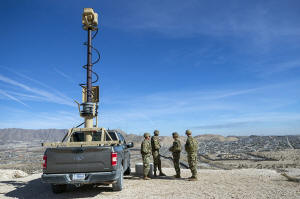New militarized border zone spurs national security charges against
hundreds of immigrants
[May 15, 2025]
By MORGAN LEE
SANTA FE, N.M. (AP) — Several hundred immigrants have been charged with
unauthorized access to a newly designated militarized zone along the
southern U.S. border in New Mexico and western Texas since the
Department of Justice introduced the new approach in late April.
President Donald Trump's administration has transferred oversight of a
strip of land along the U.S.-Mexico border to the military while
authorizing U.S. troops to temporarily detain immigrants in the country
illegally — though there's no record of troops exercising that authority
as U.S. Customs and Border Protection conducts arrests. The designated
national defense areas are overseen by U.S. Army commands out of Fort
Bliss in the El Paso area in Texas and Fort Huachuca in Arizona.
The novel national security charges against immigrants who enter through
those militarized zones carry a potential sentence of 18 months in
prison on top of a possible six month sentence for illegal entry. The
full implications are unclear for migrants who pursue legal status
through separate proceedings in federal immigration court.
The Trump administration is seeking to accelerate mass removals of
immigrants in the country illegally and third-country deportations,
including Venezuelans sent to an El Salvador prison amid accusations of
gang affiliation. The administration has deployed thousands of troops to
the border, while arrests have plunged to the lowest levels since the
mid-1960s.

The federal public defender's office in Las Cruces indicates that
roughly 400 cases had been filed in criminal court there as of Tuesday
as it seeks dismissal of the misdemeanor and petty misdemeanor charges
for violating security regulations and entering restricted military
property. Court records show that federal prosecutors in Texas — where a
National Defense Area extends about 60 miles (97 kilometers) from El
Paso to Fort Hancock — last week began filing the military security
charges as well.
Las Cruces-based federal Magistrate Judge Gregory Wormuth is asking for
input from federal prosecutors and public defense attorneys on the
standard of proof for the trespassing charges “given the unprecedented
nature of prosecuting such offenses in this factual context.”
Public defenders say there needs to be proof that immigrants knew of the
military restrictions and acted “in defiance of that regulation for some
nefarious or bad purpose.”

[to top of second column]
|

Army soldiers look at the border wall next to a surveillance vehicle
during the visit to the U.S. and Mexico border by Defense Secretary
Pete Hegseth in Sunland Park, N.M., Monday, Feb. 3, 2025. (AP
Photo/Andres Leighton, File)

New Mexico-based U.S. Attorney Ryan Ellison, appointed in April,
says hundreds of "restricted area" signs have been posted in Spanish
and English to warn that entry is prohibited by the Department of
Defense, along New Mexico's nearly 180-mile (290-kilometer) stretch
of border.
In a court filings, Ellison has said there's no danger of ensnaring
innocent people when it comes to immigrants who avoid ports of entry
to cross the border in willful violation of federal law — and now
military regulations.
ACLU attorney Rebecca Sheff said basic freedoms are at risk as the
government flexes its power at the border and restricts civilian
access.
“The extension of military bases ... it's a serious restriction,
it's a serious impact on families that live in the border area,” she
said.
The Department of Justice has warned Wormuth against issuing an
advisory opinion on legal standards for trespassing in the military
area.
“The New Mexico National Defense Area is a crucial installation
necessary to strengthen the authority of servicemembers to help
secure our borders and safeguard the country,” Ellison said in a
court briefing.
Democratic U.S. Sen. Martin Heinrich of New Mexico expressed concern
Wednesday in a letter to Defense Secretary Pete Hegseth that anyone
may be stopped and detained by U.S. Army soldiers for entering a
170-square-mile (440-square-kilometer) area along the border
previously overseen by the Department of Interior and frequently
used for recreation and livestock ranching.
Hegseth has emphasizing a hard-line approach to enforcement.
“Let me be clear: if you cross into the National Defense Area, you
will be charged to the FULLEST extent of the law,” he said in a post
on the social platform X.
___
Associated Press reporter Valerie Gonzalez contributed from McAllen,
Texas.
All contents © copyright 2025 Associated Press. All rights reserved |